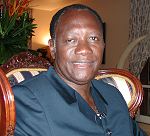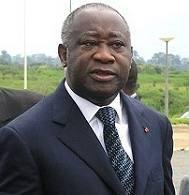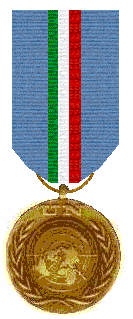
Koudou Laurent Gbagbo is an Ivorian politician who was the president of Côte d'Ivoire from 2000 until his arrest in April 2011. A historian, Gbagbo was imprisoned in the early 1970s and again in the early 1990s, and he lived in exile in France during much of the 1980s as a result of his union activism. Gbagbo founded the Ivorian Popular Front (FPI) in 1982 and ran unsuccessfully for president against Félix Houphouët-Boigny at the start of multi-party politics in 1990. He won a seat in the National Assembly of Côte d'Ivoire in 1990.
The First Ivorian Civil War was a civil conflict in the Ivory Coast that began with a military rebellion on 19 September 2002 and ended with a peace agreement on 4 March 2007. The conflict pitted the government of Ivorian President Laurent Gbagbo against a domestic insurgency led by the New Forces of Ivory Coast. Following the war, a second civil war (2010–2011) would begin over the results of the 2010 Ivorian presidential election.

Opération Licorne was a French Armed Forces peacekeeping operation in support of the United Nations Operation in Côte d'Ivoire. The French forces had been stationed in the country since shortly after the outbreak of the Ivorian Civil War. The troops' main mission was to support the United Nations peacekeeping mission and to ensure the security of French and foreign nationals.

In 2004, an armed conflict took place between French and Côte d'Ivoire forces. On 6 November 2004, two Ivorian Air force Su-25 attack fighters launched an air attack on French peacekeepers in the northern part of Côte d'Ivoire who were stationed there as part of Opération Licorne (Unicorn), the French military operation in support of the United Nations Operation in Côte d'Ivoire (UNOCI). French military forces subsequently clashed with Ivorian troops and government-loyal mobs, destroying almost the entire Ivorian Air Force. Those incidents were followed by massive anti-French protests in Côte d'Ivoire.

Presidential elections were held in Ivory Coast in 2010. The first round was held on 31 October, and a second round, in which President Laurent Gbagbo faced opposition leader Alassane Ouattara, was held on 28 November 2010. Originally scheduled to be held in 2005, the vote was delayed several times due to the Ivorian Civil War and difficulties involved in the organization and preparation of the elections. A peace agreement between the government and the former rebel New Forces was signed on 4 March 2007, and in late April 2009, it was announced that the elections would be held by 6 December 2009, and that the date would be announced shortly. On 15 May 2009, the date was announced to be 29 November 2009. On 11 November, the elections were postponed again due to delays in the electoral roll. It was announced on 3 December 2009 to be held in late February or early March 2010.

United Nations Security Council resolution 1528, adopted unanimously on 27 February 2004, after recalling resolutions 1464 (2003), 1479 (2003), 1498 (2003), 1514 (2003) and 1527 (2004) on the situation in Côte d'Ivoire, the council established the United Nations Operation in Côte d'Ivoire (UNOCI) for an initial period of twelve months.

The 2010–11 Ivorian crisis was a political crisis in Ivory Coast which began after Laurent Gbagbo, the President of Ivory Coast since 2000, was proclaimed the winner of the Ivorian election of 2010, the first election in the country in 10 years. The opposition candidate, Alassane Ouattara, and a number of countries, organisations and leaders worldwide claimed Ouattara had won the election. After months of attempted negotiation and sporadic violence, the crisis entered a decisive stage as Ouattara's forces began a military offensive in which they quickly gained control of most of the country and besieged key targets in Abidjan, the country's largest city. At the time, international organizations reported numerous human rights violations, and the UN undertook its own military action with the stated objective to protect itself and civilians.

United Nations Security Council Resolution 1962, adopted unanimously on December 20, 2010, after recalling previous resolutions on the situation in Côte d'Ivoire, including resolutions 1893 (2009), 1911 (2010), 1924 (2010), 1933 (2010), 1942 (2010), 1946 (2010) and 1951 (2010), the Council extended the mandate of the United Nations Operation in Côte d'Ivoire (UNOCI) until June 30, 2011 and urged all Ivorian parties to respect the outcome of the presidential election and the recognition of Alassane Ouattara as president.

United Nations Security Council Resolution 1967, adopted unanimously on January 19, 2011, after recalling previous resolutions on the situation in Côte d'Ivoire, including resolutions 1933 (2010), 1942 (2010), 1946 (2010), 1951 (2010) and 1962 (2010), the Council increased the number of forces in the United Nations Operation in Côte d'Ivoire (UNOCI) by 2,000. It was the first Security Council resolution adopted in 2011.

United Nations Security Council Resolution 1968, adopted unanimously on February 16, 2011, after recalling previous resolutions on the situation in Côte d'Ivoire, including resolutions 1933 (2010), 1942 (2010), 1946 (2010), 1951 (2010), 1962 (2010) and 1967 (2011), the Council extended the deployment of troops from the United Nations Mission in Liberia (UNMIL) to the United Nations Operation in Côte d'Ivoire (UNOCI) for an additional three months.

United Nations Security Council Resolution 1609 was adopted unanimously on 24 June 2005. After recalling previous resolutions on the situation in Côte d'Ivoire, the council extended the mandate of the United Nations Operation in Côte d'Ivoire (UNOCI) and supporting French forces for a further seven months until 24 January 2006.

The Second Ivorian Civil War broke out in March 2011 when the crisis in Ivory Coast escalated into full-scale military conflict between forces loyal to Laurent Gbagbo, the President of Ivory Coast since 2000, and supporters of the internationally recognised president-elect Alassane Ouattara. After months of unsuccessful negotiations and sporadic violence between supporters of the two sides, the crisis entered a critical stage as Ouattara's forces seized control of most of the country with the help of the UN, with Gbagbo entrenched in Abidjan, the country's largest city. International organizations have reported numerous instances of human rights violations by both sides, in particular in the city of Duékoué where Ouattara's forces killed hundreds of people. Overall casualties of the war are estimated around 3000. The UN and French forces took military action, with the stated objective to protect their forces and civilians. France's forces arrested Gbagbo at his residence on 11 April 2011.

United Nations Security Council Resolution 1975, adopted unanimously on March 30, 2011, after recalling previous resolutions on the situation in Côte d'Ivoire, including resolutions 1572 (2004), 1893 (2009), 1911 (2010), 1924 (2010), 1933 (2010), 1942 (2010), 1946 (2010), 1951 (2010), 1962 (2010), 1967 (2011) and 1968 (2011), the Council demanded that Laurent Gbagbo step down as President and imposed sanctions on him and his close associates.
United Nations Security Council Resolution 1981, adopted unanimously on May 13, 2011, after recalling previous resolutions on the situation in Côte d'Ivoire, including resolutions 1933 (2010), 1942 (2010), 1946 (2010), 1951 (2010), 1962 (2010), 1967 (2011), 1968 (2011), 1975 (2011) and 1980 (2011), the Council extended the mandate of the United Nations Operation in Côte d'Ivoire (UNOCI) until July 31, 2011 and extended the temporary re-deployment of United Nations troops from Liberia until June 30, 2011.

United Nations Security Council Resolution 1992, adopted unanimously on June 29, 2011, after recalling previous resolutions on the situation in Côte d'Ivoire, including resolutions 1933 (2010), 1942 (2010), 1951 (2010), 1962 (2010), 1967 (2011), 1968 (2011), 1975 (2011), 1980 (2011) and 1981 (2011), the Council extended the temporary re-deployment of United Nations troops and equipment from the United Nations Mission in Liberia (UNMIL) to the United Nations Operation in Côte d'Ivoire (UNOCI) until September 30, 2011.

United Nations Security Council Resolution 2000, adopted unanimously on July 27, 2011, after recalling previous resolutions on the situation in Côte d'Ivoire, including resolutions 1933 (2010), 1942 (2010), 1951 (2010), 1962 (2010), 1967 (2011), 1968 (2011), 1975 (2011), 1980 (2011), 1981 (2011) and 1992 (2011), and Resolution 1938 (2010) on the situation in Liberia, the Council extended the mandate of the United Nations Operation in Côte d'Ivoire (UNOCI) until July 31, 2012.
The following lists events that happened during 2010 in Ivory Coast.
The following lists events that happened during 2011 in Ivory Coast.
This period in the history of Ivory Coast was affected by the end of the 33-year reign of Félix Houphouët-Boigny in 1993, as well as demographic change which had seen the Muslim population rise from 6% in 1922 to 38.6% in 1998, including a majority in the north of the country.

France–Ivory Coast relations are the diplomatic relations between the French Republic and the Republic of Côte d'Ivoire. Both nations are members of the Organisation internationale de la Francophonie and the United Nations.

















